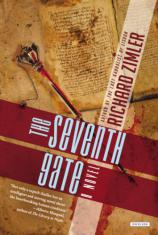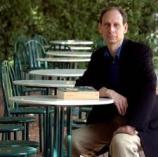The Seventh Gate
Review
The Seventh Gate
Sophie Riedesel is a teenager in Berlin in 1932. Other than being too smart for her own good with a biting sense of humor and always ready with a sarcastic remark, she’s a fairly normal young woman of the time. When Hitler begins his rise to power, her life takes a drastic turn. Her father, a scientist and a member of the Communist party with strong beliefs, suddenly switches to the Nazi party and espouses views she never thought he had. Sophie wants to believe he did it to save his job and family, but she isn’t entirely sure that’s the case. She has trouble understanding her father now, and it becomes even worse when her boyfriend, who she’s known since they were small children, also joins the party telling her things she doesn’t want to hear.
"I don’t read much about World War II because I find it such a sad time in human history, but to me this book is an exception. What drew me to it was the mystery thrown in and mixed with the idea of kabbalist mysticism."
With all the men in her once-stable life now on the wrong side of her belief system, she takes comfort in her growing friendship with an older Jewish neighbor, Isaac Zarco, and his eclectic and --- according to the Nazi party --- socially unacceptable group of friends, which includes Jews, social activists, and some former circus performers.
As Germany changes, so does Sophie. Her relationship with her father, once open and loving, becomes halting and difficult. Her already strained and distant relationship with her mother, who outwardly doesn’t seem to care for her, turns nasty. Her younger brother, Hansi, a boy who hasn’t spoken in years, is a silent comfort and burden to her at the same time. She shares things with him she doesn’t tell anyone else, secretly wishes he would go away, and deeply wants to understand what goes on in his head.
Sophie becomes more and more involved with Isaac and the work he and his friends are doing to try and stop the growing power of the Nazi party. Isaac and his friends have formed a group called the Ring, which is working to get the word out and possibly stop the atrocities taking place in Germany. When a member of the group is murdered, Sophie, having grown close to Isaac, begins investigating the murder and asking questions in places she shouldn’t. She eventually becomes so involved in Isaac’s life that he begins making plans to send her away before any harm can come to her.
I don’t read much about World War II because I find it such a sad time in human history, but to me this book is an exception. What drew me to it was the mystery thrown in and mixed with the idea of kabbalist mysticism. Sophie is growing up fast in a city hampered with new rules every day, and it was particularly interesting seeing it all happening through her eyes. She takes risks, false steps, and makes mistakes, but sticks to her beliefs even when she knows what she’s doing could bring harm to those she loves. Her life, which once revolved around her boyfriend and obsession with Hollywood movies, is now made up of a group of people she realizes she can’t live without.
Isaac, who is a scholar of Jewish mysticism, begins teaching Sophie what he knows, and her love for Isaac and understanding of what drives him becomes a force in her life she will fight for in ways she never thought possible. Seeing Sophie change from a young girl fascinated by her own growing sexuality into a woman concerned with the political implications of her country’s governmental policies was an interesting metamorphosis in the way it affected her life in a most singular way --- her family and the family she made. It’s Sophie’s ties that make this book so moving.
If you love historical fiction with characters that make no apologies for who they are and what they do, THE SEVENTH GATE is a book you should read.
Reviewed by Amy Gwiazdowski on June 15, 2012
The Seventh Gate
- Publication Date: February 4, 2014
- Genres: Fiction, Historical Fiction, Historical Thriller, Suspense, Thriller
- Paperback: 448 pages
- Publisher: Overlook TP
- ISBN-10: 1468308238
- ISBN-13: 9781468308235





